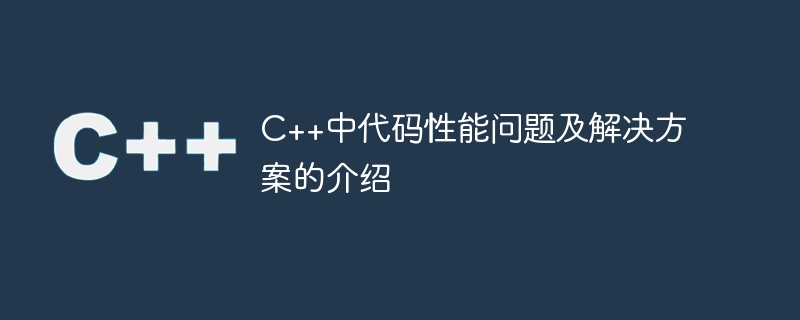

Introduction to code performance problems and solutions in C
Introduction: In the daily C development process, we often encounter some performance problems. These problems may cause the program to run slower and even affect the performance of the entire system. Therefore, understanding common performance problems and their solutions is crucial for us to optimize our code. This article will introduce some common C code performance problems and give relevant solutions.
Question 1: Repeated calculations in the loop body
In some loops, we may find some repeated calculations, for example, the same complex calculation will be performed in each iteration. This situation can cause the program to run slower. A common solution is to save the results of repeated calculations and reuse them when needed. For example, we can use variables to save calculation results instead of recalculating each time.
for (int i = 0; i < n; i++) {
int result = heavyComputation(); // 复杂计算
// 使用 result 进行后续操作
}Problem 2: Frequent memory allocation and release
In C, frequent memory allocation and release is a common performance problem. Each allocation and freeing of memory incurs additional overhead. In order to solve this problem, we can use object pool or memory pool to reduce the number of memory allocation and release.
class ObjectPool {
public:
Object* acquireObject() {
if (m_pool.empty()) {
return new Object();
} else {
Object* obj = m_pool.top();
m_pool.pop();
return obj;
}
}
void releaseObject(Object* obj) {
m_pool.push(obj);
}
private:
std::stack<Object*> m_pool;
};Problem 3: Excessive copy operations
In C, copy operations may cause performance problems, especially when the copied objects are large. To avoid this problem, we can use move semantics instead of copy operations. Move semantics transfer ownership of a resource to a new object without the need for additional copy operations.
class Object {
public:
Object(Object&& other) noexcept {
// 移动资源
}
Object& operator=(Object&& other) noexcept {
if (this != &other) {
// 移动资源
}
return *this;
}
private:
// 资源
};Question 4: Using less efficient algorithms
When writing C code, we should try to use more efficient algorithms. For example, when looking for an element, you can use a binary search algorithm instead of a linear search. Some other examples include using hash tables instead of linear searches to find elements, using bitwise operations instead of multiplications to perform calculations, and so on.
int binarySearch(const std::vector<int>& nums, int target) {
int left = 0;
int right = nums.size() - 1;
while (left <= right) {
int mid = (left + right) / 2;
if (nums[mid] == target) {
return mid;
} else if (nums[mid] < target) {
left = mid + 1;
} else {
right = mid - 1;
}
}
return -1;
}Problem 5: Lack of parallel processing
As the number of processor cores increases, it becomes increasingly important to use parallel processing to improve program performance. In C, we can use multi-threading to achieve parallel processing. For example, a task can be divided into multiple subtasks, and each subtask runs in an independent thread, thereby increasing the execution speed of the program.
void parallelProcess(std::vector<int>& nums) {
std::vector<std::thread> threads;
int numThreads = std::thread::hardware_concurrency();
int chunkSize = nums.size() / numThreads;
for (int i = 0; i < numThreads; i++) {
int start = i * chunkSize;
int end = (i == numThreads - 1) ? nums.size() : start + chunkSize;
threads.push_back(std::thread(processChunk, std::ref(nums), start, end));
}
for (auto& thread : threads) {
thread.join();
}
}
void processChunk(std::vector<int>& nums, int start, int end) {
// 处理子任务
}Conclusion: In C, code performance issues are common. To address these problems, we can improve the performance of the code by reducing repeated calculations within the loop body, optimizing memory allocation and release, avoiding excessive copy operations, using less efficient algorithms, and introducing parallel processing. By mastering these solutions, our code can be better optimized and improved, thereby improving the running speed of the program and the performance of the entire system.
The above is the detailed content of Introduction to code performance problems and solutions in C++. For more information, please follow other related articles on the PHP Chinese website!




